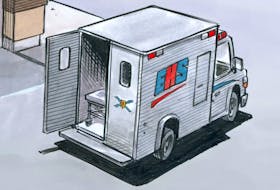The social media post was terse, likely written in haste, but it captured the frustration, desperation and anger of a doctor struggling to do what she trained for, under conditions that conspired against her.
There is “nothing short of a crisis in our (Cape Breton) regional emergency department,” Meg Keating wrote earlier this week.
“Sick patients in hallway beds; staff forced to repurpose random spaces, like washrooms, to perform assessments; 26 admitted patients waiting for beds; only enough cardiac monitors for the sickest.”
Her colleague, Margaret Fraser, saw a separate call for help from the department the same day, so she went in for a few hours. She was back at six the next morning. The chaotic conditions persisted throughout that day and into the next.
Patients were jammed everywhere, ambulances stacked up outside waiting to unload, and the relentless stream of walk-ins continued. Staff stress levels kept climbing.
“When you know you are not providing the best possible care because it is simply physically impossible, that creates stress. All that additional stress creates burnout and moral injury,” says Fraser, president of the Cape Breton Medical Staff Association.
The Nova Scotia Health Authority wants you to know that the emergency in emergency is not unique to Cape Breton, nor is it a phenomenon peculiar to Nova Scotia.
While misery is said to love company, the authority’s message about the width and breadth of the problem provides no comfort to patients or staff surviving — some barely — in the moment.
The Health Department believes the hospital redevelopment in Cape Breton addresses problems like overwhelmed emergency departments.
The emergency department at the regional hospital will be expanded by 40 per cent and Glace Bay’s emergency department will get bigger too. Of course, hospitals in North Sydney and New Waterford will close, taking their emergency departments with them.
Chris Milburn is head of emergency services in the NSHA’s eastern zone, which includes all of Cape Breton along with Antigonish and Guysborough counties on the mainland. He says bigger emergency departments aren’t the answer if there aren’t doctors to staff them, or when emergency beds are filled by patients who’ve been admitted and are waiting for an in-patient bed.
Milburn expects the doctor shortage to get worse before it gets any better.
“The physician resource picture is really bad right now,” he said. The provincial locum program “is keeping us afloat” by rotating docs into the region to work on a short-term basis.
Nova Scotia competes for physicians with other provinces, states and nations that pay more and tax less.
The redevelopment plans in Cape Breton include some added long-term care beds — the first new nursing home beds the current government, now in its sixth year, has approved.
The government has been miserly with new nursing home beds, despite the bottleneck created when hospital beds are “blocked” — occupied by folks waiting for a place in a nursing home — as they frequently are in hospitals across the province.
As a practising physician with a leadership role in the authority, Milburn sees the problems in health care from a couple of perspectives, but the one he advocates is the big picture.
“Health care has been going in this direction for over 25 years,” he said, while the problems in the system persisted and grew. But there’s never been a realistic and reasonable discussion about how to address those problems and ensure the system is sustainable. That discussion is overdue and urgent.
Yet, Nova Scotia’s government has shown no appetite for having, let alone leading, any dialogue, discourse, conversation or consultation of that nature.
The politics of health care are perilous, so governments and their surrogates — like the health authority — offer up solutions for symptoms while the underlying problems fester.
People are told the glass is half full even when the evidence suggests it’s bone dry.
Meanwhile, long waits in emergency departments become interminable with the slightest uptick in demand.
Hospitals operate at 100-per-cent capacity as a matter of course. A surge in patients, whatever the cause, pushes demand past capacity and creates the chaotic conditions described so aptly in so few words by Keating.
It also creates danger. Patients leave before they are treated, often because they are just too sick to stay.
Some will reappear but others, says Fraser, “inevitably die from lack of care. It is a straight numbers game; sooner or later someone will go home with a serious health condition and die.”
It feels like that reasonable discussion, if it will truly help, can’t wait any longer.









